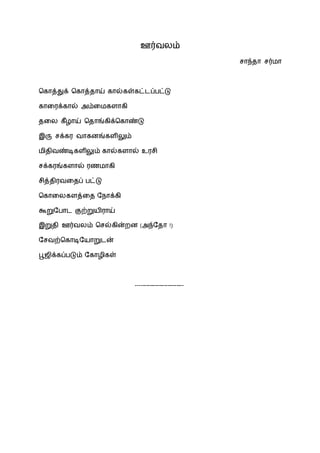ஊர்வலம்
Download as docx, pdf0 likes89 views
cruelty to poultry while becoming chicken
1 of 1
Download to read offline

Ad
Recommended
Avaravar thalaividhi
Avaravar thalaividhiBalaji Sharma
╠²
A Translated version of a hindi short story, the story is about human frailtiesதோல்வியின் வெற்றி
தோல்வியின் வெற்றிBalaji Sharma
╠²
Victory in Defeat is a wonderful story written by Sudharsan which is reprised by Shanta Sharmaகற்பனையல்ல உண்மை நிகழ்ச்சியிது
கற்பனையல்ல உண்மை நிகழ்ச்சியிதுBalaji Sharma
╠²
My friendship with a pomஉணர்வுகளுண்டு எல்லா உயிர்களுக்கும்
உணர்வுகளுண்டு எல்லா உயிர்களுக்கும்Balaji Sharma
╠²
Animal WelfarePatriotism redefined
Patriotism redefinedBalaji Sharma
╠²
This document discusses patriotism and living abroad. It argues that many Indians feel they must leave India for opportunities and money, reflecting a lack of opportunities in India (Paragraph 1). However, many work in difficult conditions abroad with their passports confiscated (Paragraph 1). The document questions why educated Indians cannot instead build up India, as countries like Japan and Singapore have done (Paragraph 1). It also criticizes Indians for being selfish and only caring for their own comfort, while begging or feeling ashamed of their Indian identity abroad (Paragraphs 2-3). In contrast, it notes that foreigners embrace Indian culture in places like ISKCON temples (Paragraph 3). It shames Indians for wanting to imitate the West rather than respectingதிரும்புகிறதா பண்டைய முறை
திரும்புகிறதா பண்டைய முறைBalaji Sharma
╠²
Food habits and milletsRight wrong
Right wrongBalaji Sharma
╠²
The document describes an experience the author had as a student where they were asked to identify the tense of the verbs "I See you" and "I am seeing you" and answered "Past Tense", which made their classmates laugh. When the teacher said they gave the wrong answer despite explanations, the author politely disagreed and asked to explain their reasoning: that when words are spoken, they mix with the air and move into the past, so they don't think they should lie. The author argues that grammatically it could be present or present continuous tense, but factually all actions constantly migrate to the past, so past has a strong existence and present is also past. They ask the teacher to clarify if their view is right orतुम बिन जाएँ कहाँ
तुम बिन जाएँ कहाँBalaji Sharma
╠²
A hilarious poem on my mum's predicamentसर्वे भवन्तु सुखिन
सर्वे भवन्तु सुखिनBalaji Sharma
╠²
A wonderful poem on love every living beingMore Related Content
More from Balaji Sharma (20)
கற்பனையல்ல உண்மை நிகழ்ச்சியிது
கற்பனையல்ல உண்மை நிகழ்ச்சியிதுBalaji Sharma
╠²
My friendship with a pomஉணர்வுகளுண்டு எல்லா உயிர்களுக்கும்
உணர்வுகளுண்டு எல்லா உயிர்களுக்கும்Balaji Sharma
╠²
Animal WelfarePatriotism redefined
Patriotism redefinedBalaji Sharma
╠²
This document discusses patriotism and living abroad. It argues that many Indians feel they must leave India for opportunities and money, reflecting a lack of opportunities in India (Paragraph 1). However, many work in difficult conditions abroad with their passports confiscated (Paragraph 1). The document questions why educated Indians cannot instead build up India, as countries like Japan and Singapore have done (Paragraph 1). It also criticizes Indians for being selfish and only caring for their own comfort, while begging or feeling ashamed of their Indian identity abroad (Paragraphs 2-3). In contrast, it notes that foreigners embrace Indian culture in places like ISKCON temples (Paragraph 3). It shames Indians for wanting to imitate the West rather than respectingதிரும்புகிறதா பண்டைய முறை
திரும்புகிறதா பண்டைய முறைBalaji Sharma
╠²
Food habits and milletsRight wrong
Right wrongBalaji Sharma
╠²
The document describes an experience the author had as a student where they were asked to identify the tense of the verbs "I See you" and "I am seeing you" and answered "Past Tense", which made their classmates laugh. When the teacher said they gave the wrong answer despite explanations, the author politely disagreed and asked to explain their reasoning: that when words are spoken, they mix with the air and move into the past, so they don't think they should lie. The author argues that grammatically it could be present or present continuous tense, but factually all actions constantly migrate to the past, so past has a strong existence and present is also past. They ask the teacher to clarify if their view is right orतुम बिन जाएँ कहाँ
तुम बिन जाएँ कहाँBalaji Sharma
╠²
A hilarious poem on my mum's predicamentसर्वे भवन्तु सुखिन
सर्वे भवन्तु सुखिनBalaji Sharma
╠²
A wonderful poem on love every living beingகற்பனையல்ல உண்மை நிகழ்ச்சியிது
கற்பனையல்ல உண்மை நிகழ்ச்சியிதுBalaji Sharma
╠²
உணர்வுகளுண்டு எல்லா உயிர்களுக்கும்
உணர்வுகளுண்டு எல்லா உயிர்களுக்கும்Balaji Sharma
╠²
ஊர்வலம்
- 1. ஊர்வலம் சாந்தா சர்மா ககாத்துக் ககாத்தாய் கால்கள்கட்டப்பட்டு காரைக்கால் அம்ரமகளாகி தரல கீழாய் கதாங்கிக்ககாண்டு இரு சக்கை வாகனங்களிலும் மிதிவண்டிகளிலும் கால்களால் உைசி சக்கைங்களால் ைணமாகி சித்திைவரதப் பட்டு ககாரலகளத்ரத ந ாக்கி கூறுநபாட குற்றுயிைாய் இறுதி ஊர்வலம் கசல்கின்றன (அந்நதா !) நசவற்ககாடிநயாறுடன் பூஜிக்கப்படும் நகாழிகள் ---------------------------
